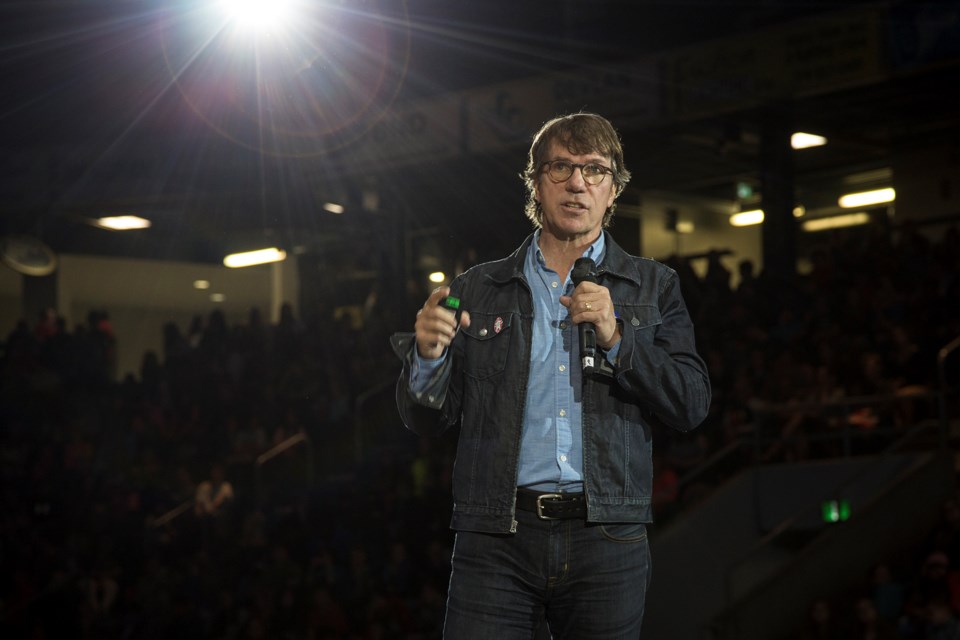Tasked with continuing the legacy of his brother Gord’s final project, Mike Downie spoke to 5,400 area schoolchildren on Thursday about The Secret Path — a multimedia project that teaches the story of the residential school system in Canada through the death of Chanie Wenjack.
“Gord wanted it to be in every classroom in the country. It’s getting there,” Mike told GuelphToday in an interview immediately prior to him going on stage.
In solo work and through his band The Tragically Hip, Gord spent his career creating a sort of soft patriotism through song, said Mike, making ordinary places like Bobcaygeon seem mythical, shouting out Jacques Cartier and the CBC and working hockey into the lyrics of numerous songs.
But Mike said his brother flipped all of that on its ear for his final project about the residential school system by saying we are not who we think we are.
“I think it’s incredible for a body of work to spend all of those years building up these Canadian ideas and then in the last years of your life say, ‘here’s one more thing, we can be a lot better. Don’t be so quick to reach out and pat yourself on the back',” said Mike.
Wenjack was 12 years old in 1966, when he attempted to run away from the Cecelia Jeffrey Indian Residential School in Kenora, Ont., where he had been forced to live and go to school for three years.
With only a light windbreaker, Wenjack died of hunger and exposure after walking for 36 hours as the temperature dropped to minus 6 degrees Celsius.
Mike heard the story of Wenjack’s death on a radio documentary about five years ago and immediately told his little brother Gord.
“When I first heard it and told him, it grabbed him. He was a healthy man then and we worked on this for two or three years, leading up to his diagnosis,” said Mike.
After Gord was diagnosed with a glioblastoma, Mike said his brother’s work on the project accelerated. The Secret Path began as a poem, which became an album, then a graphic novel and finally an animated short that married all of the components.
The Secret Path is now part of the curricula at many schools across Canada.
“Kids — earlier than we think — really understand injustice and it kind of infuriates them. They really don’t like it,” said Mike. “I think they are going to grow up so differently than we did.”
On Thursday, the Upper Grand District School Board hosted Empowerment Day, where 5,400 students from across the district filled the Sleeman Centre to hear from a diverse range of speakers.
Mike spoke about The Secret Path Project, while musician Serena Ryder spoke about mental health challenges. Michel Chikwanine recounted his time as a child soldier in the Democratic Republic of Congo and Myrna Hutchison spoke about suicide prevention.
Mike said the interest in social justice by today’s youth may be the key to working toward solutions to a number of issues, including reconciliation with Indigenous people.
“Gord always had a feeling the country was incomplete in a way," said Mike. "In his early days when he was a young guy, he said there was always something not right. I believe, and I know he did in that years of his life he came to realize the missing piece for him was the Indigenous piece of the puzzle.”
Mike said his brother really nailed it during the final The Tragically Hip concert in Kingston, — which was televised coast to coast — when he called the Indigenous people in Canada ’a people we have been trained to ignore’.
“I think for a lot of people it wasn’t malevolent, it was just ignorance. It doesn’t relieve us of that responsibility, because once you know — you know. There’s no turning back, you can’t pretend you didn’t know residential schools existed,” said Mike.
He acknowledges that reconciliation will take a long time and will require everyone to buy in to the concept.
“As much as the government has to create different relationships with First Nations and all Indigenous people, I don’t think it’s okay to leave it up to government — I think it’s up to all Canadians to find a way to change the relationship so that Indigenous people know there are a lot of us that really do care,” said Mike. “With the Downie Wenjack Fund, we see that as our role — or at least to contribute to — motivating and inspiring Canadians to act.”
